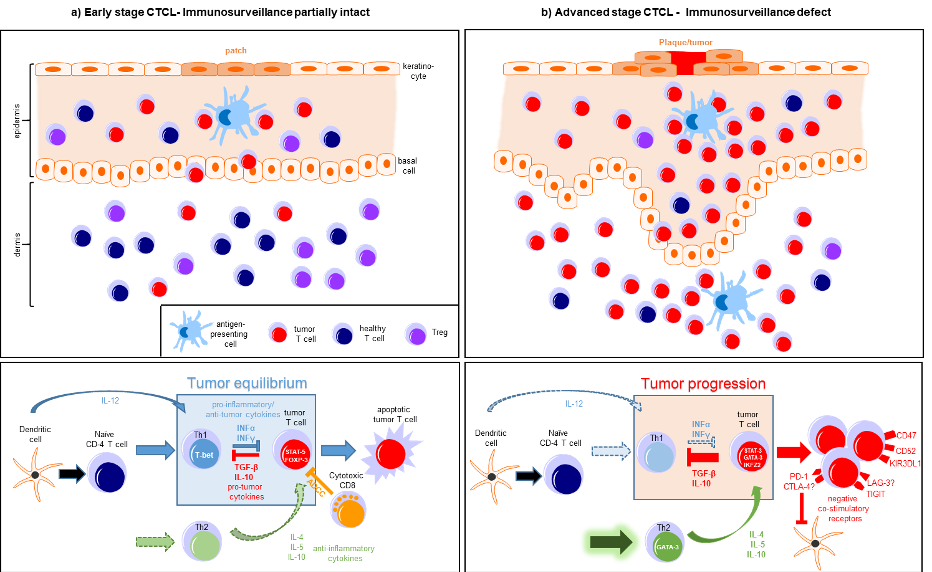What we investigate
Our group performs research at the crossroads of immunology and tumor biology, with a focus on primary cutaneous cell lymphomas and inflammatory skin diseases. Recently we laid a focus on understanding the innate and adaptive immune mechanisms and their impact on the development of skin T cell responses against non-self/cancer.
KEYWORDS
immune evasion, immune suppression, innate immunity in the skin, T cells, skin lymphoma

Our research in more detail
We performed T cell receptor matched functional profiling at a single cell resolution of T cells isolated from human blood or particularly skin. Our studies on cutaneous T-cell lymphoma (CTCL) found that the immune system in CTCL patients is locked in a compromised, mostly interleukin 4 (IL-4) and TH2-dominated status. This immune deviation is clinically important, as it defines the relevant inability of the patientsí immune system to fight the tumor, as well as bacterial and viral infections. Especially intriguing are our pioneer data on the immune suppressive role of type 2 cytokines acting on cells of the innate immune system. These findings have guided us to study the role of crucial negative immune regulators, such as the activating transcription factor 3 (ATF3) in type 2-mediated immune suppression in the skin and in sepsis and post-septic immune suppression.
Translating our experimental knowledge from inflammatory to neoplastic disease, we currently dissect how malignant T cells in cutaneous T cell lymphoma impact immune defense, neoplastic progression, and therapeutic resistance, with an emphasis on the immunomodulatory and immunoevasive properties of the malignant T cell population in the skin.
Selected publications
SKINTEGRITY.CH Principal Investigators are in bold:
- Saulite I+, Ignatova D+, Chang YT, Fassnacht C, Dimitriou F, Varypataki E, Anzengruber F, Nägeli M, Cozzio A, Dummer R, Scarisbrick J, Pascolo S, Hoetzenecker W, Bobrowicz M, and Guenova E (2020). Blockade of programmed cell death protein 1 (PD-1) in Sézary syndrome reduces Th2 phenotype of non-tumoral T lymphocytes but may enhance tumor proliferation. OncoImmunology 9, 1 [epub, ahead of print]. +Joint first authors
- Guenova E+, Watanabe R+, Teague JE, Desimone JA, Jiang Y, Dowlatshahi M, Schlapbach C, Schaekel K, Rook AH, Tawa M, Fisher DC, Kupper TS, and Clark RA (2013). Th2 cytokines from malignant cells suppress Th1 responses and enforce a global Th2 bias in leukemic cutaneous T-cell lymphoma. Clin Cancer Res, 19, 3755-3763. +Joint first authors
- Guenova E+, Skabytska Y+, Hoetzenecker W+, Weindl G, Sauer K, Tham M, Kim KW, Park JH, Seo JH, Ignatova D, Cozzio A, Levesque MP, Volz T, Köberle M, Kaesler S, Thomas P, Mailhammer R, Ghoreschi K, Schäkel K, Amarov B, Eichner M, Schaller M, Clark RA, Röcken M, and Biedermann T (2015). IL-4 abrogates TH17 cell-mediated inflammation by selective silencing of IL-23 in antigen-presenting cells. Proc Natl Acad Sci U S A 112, 2163-2138. +Joint first authors
- Hoetzenecker W+, Echtenacher B+, Guenova E+, Hoetzenecker K, Woelbing F, Brück J, Teske A, Valtcheva N, Fuchs K, Kneilling M, Park JH, Kim KH, Kim KW, Hoffmann P, Krenn C, Hai T, Ghoreschi K, Biedermann T, and Röcken M (2011). ROS-induced ATF3 causes susceptibility to secondary infections during sepsis-associated immunosuppression. Nat Med, 18, 128-123. +Joint first authors
